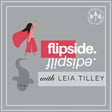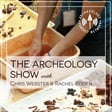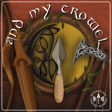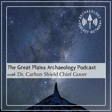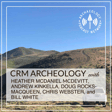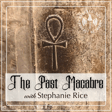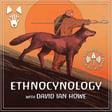
95th Anniversary, Agatha Christie Disappears For 11 Days - Ep 7
20th December - Episode 7 - 95th Anniversary, Agatha Christie Disappears For 11 Days. (3rd December 1926)
It is quite common for mystery to be associated with the festive season, in particular, adaptions of Agatha Christie's famous work have had a place as Christmas reading or nowadays watching since they were first published. This is a tradition which holds today with my own family and in honor of the season we want to share it with you! This episode is luckily then inspired by the 95th Anniversary of the most mysterious event in Christie's own life, her disappearance for 11 days whereupon she reappeared with apparent amnesia, on 3rd December 1926. But how is archaeology involved... well, in quite a few ways actually, Christie was a pretty brilliant archaeologist-in-training, was married to a professional archaeologist, was a fixture at many Middle and Near Eastern sites, and wrote quite a bit of insightful narrative surrounding archaeology in her fiction novels. Joining me this episode is Dr. Rebecca Mills a lecturer in Communications and English at the University of Bournemouth, also Agatha Christie aficionado. From my family to yours, Merry Christmas, Yule, or simply Happy Holiday Season, may next year be utterly brilliant for all of you!
Dr. Mills has rather brilliantly also provided a further reading list below:
Graphic biography: The Real Life of Agatha Christie, by Anne Martinetti and Guillaume Lebeau, illustrated by Alexandre Franc, translated by Edward Gauvin (SelfMadeHero, 2016)
J.C. Bernthal, Queering Agatha Christie: Revisiting the Golden Age of Detective Fiction (Palgrave 2016)
Christopher Prior, 'An Empire Gone Bad: Agatha Christie, Anglocentrism and Decolonization' in Cultural and Social History: The Journal of the Social History Society Volume 15:2 (2018)
More about Christie's young women: Merja Makinen, Agatha Christie: Investigating Femininity (Palgrave 2006)
Rebecca Mills and J.C. Bernthal, editors, Agatha Christie Goes to War (Routledge 2021)
More about Death on the Nile and Appointment with Death: Brittain Bright and Rebecca Mills, 'The Revelations of the Corpse: Interpreting the Body in the Golden Age Detective Novel' in New Perspectives on Detective Fiction
Mystery Magnified, edited by Casey Cothran and Mercy Cannon (Routledge 2015)
Brittain Bright, Beyond the scene of the crime : investigating place in Golden Age detective fiction (Doctoral Dissertation, Goldsmiths University 2015) https://ethos.bl.uk/OrderDetails.do?uin=uk.bl.ethos.650408
Nadia Atia has a forthcoming chapter on Orientalism in Christie's work in the forthcoming Bloomsbury Handbook to Agatha Christie (November 2022)
Music
Intro/Outro Music - Creative Commons - "Fantasia Fantasia" Kevin MacLeod (incompetech.com). Licensed under Creative Commons: By Attribution 4.0 License. http://creativecommons.org/licenses/by/4.0/
ArchPodNet
- APN Website: https://www.archpodnet.com
- APN on Facebook: https://www.facebook.com/archpodnet
- APN on Twitter: https://www.twitter.com/archpodnet
- APN on Instagram: https://www.instagram.com/archpodnet
- Tee Public Store
Affiliates
